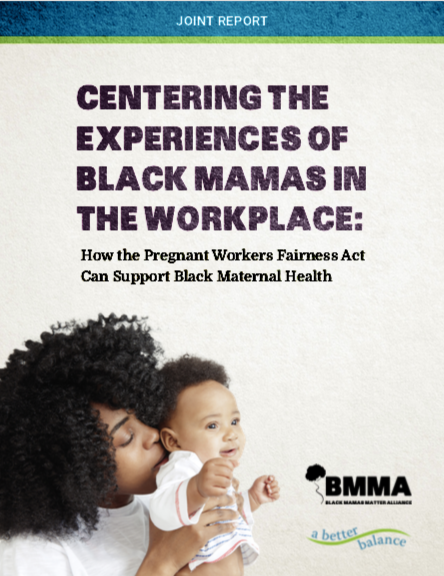Download PDF version of report here.
Published March 2022
EXECUTIVE SUMMARY

Pregnant and postpartum workers consistently face discrimination by being denied reasonable accommodations in the workplace for pregnancy, lactation, and other postpartum needs. The current federal laws that are meant to protect pregnant and postpartum workers are failing to do so.
Together, Black Mamas Matter Alliance and A Better Balance conducted a listening session with Black birth workers and Black organizational leaders from nine states, including Alabama, Georgia, Florida, Texas, Ohio, Michigan, Maryland, California, and New York, to discuss the ways they directly support Black pregnant and postpartum workers as they navigate pregnancy accommodations in the workplace. The listening session revealed that, too often, Black pregnant and postpartum workers are faced with the impossible choice between maintaining their health or supporting themselves and their families due to the lack of pregnancy accommodations.
We recommend that Congress immediately pass the Pregnant Workers Fairness Act (PWFA), which provides employees the right to reasonable accommodations for limitations related to pregnancy, childbirth, or related medical conditions, including lactation, absent undue hardship on employers. While no single piece of legislation can end the systemic racism that contributes to the Black maternal health crisis, policies like the Pregnant Workers Fairness Act are an important step in addressing Black pregnant and postpartum people’s health, safety, dignity, and economic security.
How to Read this Report: This report includes a description of the listening session, participants’ narratives, a discussion of these narratives, the gaps in current law, and our policy recommendations. We encourage readers to center the narratives and experiences shared by listening session participants and to further consider the legacies of Black women’s reproductive oppression and labor exploitation in the United States. We also encourage readers to consider the ways this issue resonates, or does not, with their own experiences and those of their coworkers and community members. While this report centers on a federal policy recommendation, it should also spark reflection from readers on actions they can take in their daily lives to act in solidarity with Black pregnant and postpartum people, in the workplace and beyond.
Congress must pass the Pregnant Workers Fairness Act now.
Read the full report:
